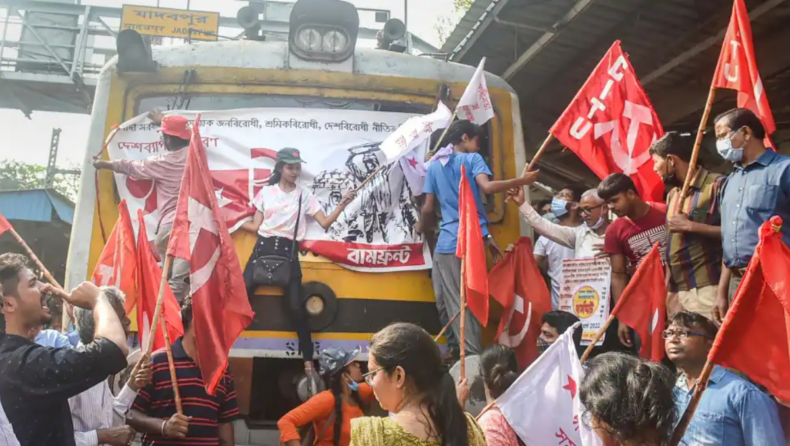As trade unions called for a two-day Bharat bandh, several states including Kerala and Haryana were found disturbed from day-to-day lifestyles.
While the two-day nationwide strike called by major trade unions to protest against the central government’s alleged wrong policies failed to evoke much response in the BJP-ruled Tripura on Monday, the first day of the stir, officials said. Attendance in government offices and educational institutions was normal.
Private schools, however, remained shut for the safety of students due to the wake of the protests. Vehicles were seen plying on roads while train services and flight operations were normal. Banks, financial institutions, markets and business establishments remained open in Agartala, the Tripura capital city.
Public transport services were affected in Haryana on Monday as the Roadways employees supported the two-day nationwide strike call given by a joint forum of the central trade unions to protest against the Centre’s “assumed” wrong policies that are affecting farmers, workers and people. Commuters had to face a tough time as the bus services remained suspended at several depots of Haryana Roadways.
Why Bharat bandh?
A joint forum of central trade unions has called for a Bharat Bandh on March 28 and 29 to show their dissatisfaction against the economic policies of the Central government.
Trade organizations such as Indian National Trade Union Congress, All India United Trade Union Centre, Trade Union Coordination Centre, and All India Trade Union Congress, among other central trade unions, are a part of the joint forum.
Several associations, including the All-India Bank Employees Associations have guaranteed their participation. Most branches and ATMs of state-owned banks are likely to be impacted on March 28 and March 29 due to the strikes.
The State Bank of India, country’s largest state-owned bank in a regulatory filing, said “We advise that, while the bank has made necessary arrangements to ensure normal functioning in its branches and offices on strike days,” adding that “work in our bank may be impacted to a limited extent by the strike.”
Looking into the social media platform, Facebook, the All-India Bank Employees Association said that employees of the banking sector will join others in the nationwide strike against policies impacting workers, farmers, and the common man.
Besides banking sector employees, workers of the insurance sector will also take part in the bandh. Moreover, workers employed in electricity, roadways and transport department in Haryana and Chandigarh are also likely to join.
Also, workers in coal, steel, oil, and copper plants among other sectors, will also take part in the Bharat Bandh on March 28 and March 29. Telecom, postal, and income tax employees will also show support by joining in the protests.
Kerala High Court ordered government to restrict the employees to take part in strike
Kerala High Court directs the state government to issue an order restricting the state government employees from participating in the two-day nationwide Bharat Bandh.
Court also observes that it is illegal that state government employees are participating in the strike.
Supporters of the two-day nationwide strike Monday put up rail and road blockages in various places in West Bengal to impose the Bharat Bandh.
Left workers were seen blocking railway tracks in Jadavpur, Dum Dum, Barasat, Shyam Nagar, Belgharia, Joynagar, Domjur, and other places to protest against the Centre’s policies. The police later lifted the blockades to resume rail services.
A joint forum of central trade unions, supported by the All-India Bank Employees Association, has called for a nationwide strike today and tomorrow, March 29 against the Central government’s policies affecting workers, farmers, and people in general.
The decision comes following a meeting on March 22 where the trade unions said that they would protest against the Centre’s “anti-worker, anti-farmer, anti-people and anti-national policies”. The bank unions are participating to protest against the government’s plan to privatize public sector banks, as well as the Banking Laws Amendment Bill 2021.
Published By :- Shubham Agarwal
Edited By :- Kritika Kashyap













